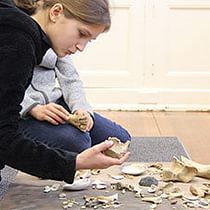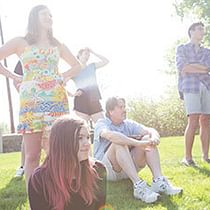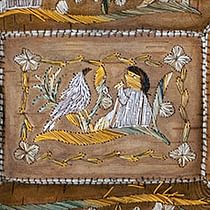Linda S. Cordell Memorial Research Award
This award supports research at the Robert S. Peabody Institute of Archaeology using the collections of the museum. The endowment was named in honor of Dr. Linda S. Cordell, a distinguished archaeologist, who specialized in the American Southwest.
History
Linda S. Cordell (1943-2013) was professor emerita at the University of Colorado Boulder, a senior scholar at the School for Advanced Research on the Human Experience, in Santa Fe, external faculty at the Santa Fe Institute, and the former director of the University of Colorado Museum of Natural History, Boulder. A member of the National Academy of Sciences and the American Academy of Arts and Sciences, she received the A. V. Kidder Medal for eminence in American Archaeology from the American Anthropological Association, and a Lifetime Achievement Award from the Society for American Archaeology. She was a dedicated and long-time member of the Peabody Advisory Committee and is greatly missed by her colleagues at the museum. Linda’s publications on the archaeology of the Southwest are well-known to scholars and the general public. Learn more about Dr. Cordell.
Linda’s commitment to scholarship and research was the catalyst for the creation of an endowed award in her memory at the Peabody Museum.
Criteria
Professionals in archaeology, anthropology, art, and allied social, natural, and physical sciences interested in using the collections of the Robert S. Peabody Institute of Archaeology. Preference is given to Ph.D. candidates and junior faculty at colleges and universities.
The Robert S. Peabody Institute curates artifacts, documents, and images pertaining to indigenous cultures of the Americas, past and present. The geographical areas with the most complete representation are the Northeastern, Southeastern, and Southwestern United States; as well as the Arctic and Subarctic, Central and South America, and Mexico. A full list of the sites represented in our collection can be found here.
The Peabody Institute is also committed to involving Indigenous communities and groups in research efforts involving Peabody collections (archives, photographs, and items), including decision-making about the appropriateness of research activities and analysis. Consultation is required as part of any application for access to collections.
Application Information
Applications will include:
- completed application form;
- one letter of recommendation from faculty advisor (if Ph.D. candidate), academic department chair (if junior faculty), or professional reference;
- current curriculum vitae. The Linda S. Cordell Memorial Research Award application is available from Ryan Wheeler.
Applications will be reviewed and ranked by the Linda S. Cordell Memorial Research Award subcommittee, with awards announced annually in the fall and spring. Any destructive sampling or analysis will require approval from Peabody Collections Oversight Committee. Recipients may be invited to share their research with students and faculty at Phillips Academy. Awards support research at the Robert S. Peabody Institute of Archaeology using the collections of the museum.
Applications should be submitted to the director, Robert S. Peabody Institute of Archaeology. Submissions, including letters of recommendation, should be submitted by email. Award recipients will be selected and notified in the fall and spring. The Award may be used anytime during the 12 month period following notification. Multiple awards may be made each year.
Past Recipients
2021
Dr. Arthur Anderson, Assistant Teaching Professor in Archaeology at the University of New England, and Dr. Gabe Hyrnick, Associate Professor of Anthropology at the University of New Brunswick – Ferdericton. Their research focuses on the very earliest period of European interaction with Maine and the Maritime Provinces. They have been reexamining the material recovered by the Northeastern Archaeological Survey from the late 1940s to middle 1950s.
2020
The Cordell Award was postponed due to the COVID-19 global pandemic.
2019
Juan Yataco is a master’s student at Yamagata University in Yamagata, Japan and is the lithic curator of the Museum of Archaeology and Anthropology of the University of San Marcos, Peru. Juan’s research is focused on a reevaluation of lithic material excavated by Richard “Scotty” MacNeish from the Ayacucho Basin of Peru to augment the public record of those sites.
2018
Katie Kirakosian was awarded the Cordell Award again in 2018 to continue her research on Warren K. Moorehead, the Peabody’s first curator and second director.
Gabrielle Greenlee is a PhD candidate at the University of California, Santa Cruz. Her research investigates how surface details on textiles, such as fringes and embroidery, may also be considered as references to indigenous notions of territoriality, e.g. starting from the question of what it means for the edges of certain garments to be embellished in certain ways. Ms. Greenlee examined ancient Peruvian textiles in our collection.
2017
Katie Kirakosian received her PhD from UMass Amherst in 2014 and is currently adjunct faculty at several schools in Rhode Island. Her project focuses on archival materials from Warren Moorehead, Douglas Byers, and Frederick Johnson to continue her dissertation research and prepare a book on the history of archaeology in Massachusetts using social network analysis. Dr. Kirakosian published some of her previous research using Peabody collections in the 2015 issue of the Bulletin of the History of Archaeology.
John Campbell is a PhD candidate at the Memorial University of Newfoundland. His research at the Peabody includes a re-examination of collections from the Dennysville site in Maine, as well as several other sites in New Brunswick. His dissertation research is focused on protohistoric and contact period Wabanaki peoples in Maine and the Canadian Maritimes.
2016
Dave Thulman is an assistant professorial lecturer at George Washington University where he teaches courses on human rights and ethics, cultural property, the archaeology of North America, and the peopling of the Americas. He received the Linda S. Cordell Memorial Research Award to support his ongoing documentation of Paleoindian and Early Archaic period artifacts. Dave has already collected over 5,000 early stone tool images, mainly from the Southeast, and new data from the Peabody’s collections would be used in several shape analyses, particularly looking at shape differences and assessing the degree of regional variation. He notes that current shape analyses of Paleoindian tools have been done on small datasets and that his “intent is to analyze hundreds of Paleoindian and Early Archaic artifacts to produce robust statistical inferences about temporal and spatial group relationships.”
2015
Jessica Watson is a Ph.D. candidate at University at Albany-SUNY. Her research involves analysis of animal bones from the Frisby-Butler and Hornblower II sites on Martha’s Vineyard. These collections were donated to the Peabody in 2012 by Jim Richardson and represent excavations made in 1982 with the late archaeologist Jim Peterson. Jessica says her dissertation research will use “faunal assemblages from sites in the Northeastern U.S. … (to) examine human-environmental interactions by identifying changes in animal populations during early European colonization (ca. 1600-1700).” Her dissertation is tentatively titled Ecological Effects of Colonization on Mammals and Birds along the Northeastern Atlantic Coast.
Adam King is research associate professor at the South Carolina Institute of Archaeology and Anthropology, University of South Carolina. His Cordell project focuses on Warren Moorehead’s 1925-1927 excavations at the Etowah site village near Cartersville, Georgia. King says, “my goal is to use the artifacts and documents produced to help evaluate the … ideas about the distribution of village areas at the site and the possibility that the Late Wilbanks village was burned.” He plans to examine pottery collections from the site and collect carbon samples for radiocarbon dating. Adam’s dissertation on the Etowah site was published as Etowah: The Political History of a Chiefdom Capital (2003) and his research was instrumental in NAGPRA determinations of affiliation made by the Peabody in the 1990s.
2014
University of Connecticut Ph.D. candidate Zac Singer was the first recipient of the Linda S. Cordell Memorial Research Award, which supported his reanalysis of the Neponset site collection, specifically focusing on the middle Paleoindian (circa 10,000 to 11,000 years ago) assemblage from the site. Singer will use the data to complement his excavation and analysis of a Paleoindian site on the Mashantucket Pequot Reservation in southeastern Connecticut. This research will expand understanding of Paleoindian life in the Northeast, including study of lithic sources and stone tool manufacture; the work also will document a significant but little-studied Peabody Museum collection.







